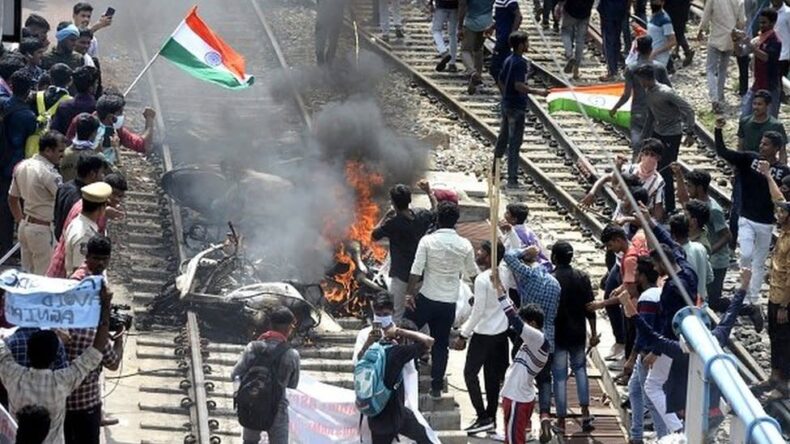Analysts claim the plan is “flawed and deserves a comprehensive assessment” since India faces a dual danger on its borders with China and Pakistan, two hostile neighbours.
Two days after the government announced a significant change in the recruiting procedure for the Indian armed services, violent demonstrations erupted in several critical Indian cities on Thursday.
Hundreds of young hopefuls protested the new short-term recruiting strategy modelled after the US army, which they claim will leave them jobless by setting train carriages on fire, blocking railroad tracks and roadways, and fighting with security personnel.
Protests
On Tuesday, the Indian government revealed the “Agnipath” or “Path of Fire” initiative, which would induct applicants for a temporary four-year contract into the navy, air force, and army. Only 25% will be kept when this programme is over, and the rest will be released.
Rajnath Singh hails the decision as a “major defence policy change”. It will make the Indian armed forces more “battle-ready” and younger, which has been a long-standing issue for one of the major forces in the world.
Numerous protesters shouted “down with the Indian government” and “give us employment or kill us” as they took to the streets of Bihar, Rajasthan, Haryana, and Uttar Pradesh to call for the cancellation of the proposal.
However, when protests grew more vociferous, many train cars were set on fire in Chhapra, Bihar’s Saran district.
According to Sanjay Singh, assistant director-general of police in the eastern state of Bihar, “the demonstrators set fire to a train bogie [coach] in one area.”
Highways and railroad lines were blocked in other locations.
Due to protests, around 22 East Central Railway trains in Bihar were cancelled, and 29 others were delayed.
Agnipath Scheme
According to the new strategy, between 45,000 and 50,000 troops would be chosen yearly among applicants between 17.5 and 21.
Only 25% of yearly recruits will be permitted to serve another 15 years under permanent commission; the remaining recruits will be discharged with skill certifications and bridge courses.
The lowest levels’ work tenure, which may have lasted up to 17 years, has been considerably shortened.
Throughout the four years, successful candidates would get perks and a monthly salary of Rs 30,000 (£316). After their contract, the temporary employees will get Rs 11,71,000 (£12,372).
One of the primary advantages of entering the military services for hundreds of thousands of hopefuls was getting a pension after serving for four years.
This perk gave social stability to people from disadvantaged backgrounds who lacked the money to pursue higher education for alternative job alternatives.
One of the key employers in the nation was the Indian army, one of the largest in the world, with 1.4 million soldiers.
But the tension was already rising since the coronavirus pandemic had halted hiring for the previous two years, and applicants were concerned about exceeding the age restriction.
“After only four years of employment, where will we go? After four years of service, we will be homeless. The country’s authorities will now learn that the public is aware since we have clogged the highways, said a protestor.
Politicians and army veterans have also been divided over the new programme, with many arguing that a lack of employment stability might result in poor motivation. Additionally, there is a chance that thousands of young, unemployed people who are trained in handling weapons might disrupt law and order.
As India deals with the stark reality of a two-front danger on borders with hostile neighbours Pakistan and China, he added, the system is “flawed and deserves a holistic assessment.”
It is a “retrograde move” and “the most harmful action perpetrated on armed forces,” according to retired Lieutenant General Zameer Uddin Shah.
“The soldier would have only 2.5 years to service, which is inadequate to develop regimental culture, attachment, and discipline,” the veteran claimed. A year will be spent on training and six months on pre-release paperwork.
The idea “baffled,” according to retired major general GD Bakshi.
“At first, I assumed it was an experiment conducted as a pilot project. The Indian armed forces are being changed completely to become a short-term quasi-conscript force like the Chinese. Please don’t do it for the love of God, he pleaded in a tweet.
At a time when China and Pakistan are posing serious dangers, let’s not undermine our institutions. The military has done an excellent job. Let’s avoid destroying what we already have only to save money.
Analysts say scheme is ‘flawed and merits a holistic review’ as India faces two-front threat on borders with hostile neighbours Pakistan and China













